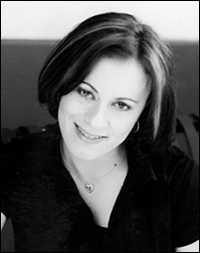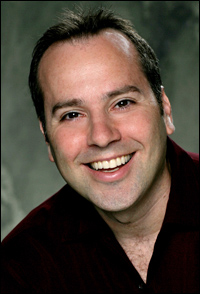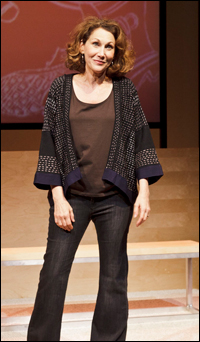
*
A dizzy mix of monologues and playlets, Off-Broadway's Motherhood Out Loud could rightfully be called a natural outgrowth of The Sisterhood of The Nerd.
Susan R. Rose and Joan Stein plead guilty as charged, having met in 1987 among the producers who brought Larry Shue's comedy of frayed friendship to Broadway for a run that would last 441 performances. That deal sealed their own friendship, which exists to this day and is currently manifesting itself in the potpourri of maternal material now at Primary Stages at 59E59 Theaters.
"Only good friends like Susan and I could have worked this long, this hard, with so many people," says Stein. "You have to be really, really close and trusting and loving friends and constant professionals to go through this kind of development process."
At this point, the two can — and often do — finish each other's sentences. Such single-mindedness started, admits Stein, with an idea from Rose that came to her as she sailed, inspired, out of Bridge & Tunnel, Sarah Jones' Tony-winning, ethnic-splattered melting-pot of a show about New York City's immigrant experience. It started Rose thinking about other universal subjects that haven't really been dealt with theatrically, and, in time, her mind lighted on motherhood. But this was a bit too big of a topic for one producer and one coast, so she contacted her producer-pal, Stein, who had subsequently relocated to Los Angeles, and the two of them began to fan out all over both coasts to find writers who were responsive to their premise.
"Initially," says Stein, "we went to the ones who had personal stories to explore — to writers who would share their own stories, whether it was Theresa Rebeck telling about what it's like being stepmother to a baby she had adopted in China…"
"… or somebody who has a special-needs child," Rose injects, jumping in at the first pause. "We wanted to have a very diverse set of motherhood experiences, and that became difficult because we had to choose writers and then make sure each writer was going to be writing about something else. We didn't want to duplicate ideas. It became an enormous puzzle of fitting pieces together and maintaining a tone…"
"…and trying to figure out how the evening was going to have a beginning, a middle and an end," Stein adds. "We didn't want to be just a series of monologues."
 |
||
| Annie Weisman |
"There's one word — motherhood — that describes a zillion different experiences," seconds Stein. "It's an umbrella, and no one's experiences are the same, so what we're trying to do is to create a community where people can share their stories."
"Also," qualifies Rose, "even if you're not a mother, you have a mother, so we all can relate to the material. Everyone will see something of themselves in the evening."
The choice catches from both coasts include at least one Pulitzer Prize playwright (Crimes of the Heart's Beth Henley) and other worthies heading in a similar direction: Cheryl L. West, Rebeck, Leslie Ayvazian, Luanne Rice, Jessica Goldberg, Lisa Loomer, Lameece Isaaq, Claire LaZebnik — all with individualized stories to tell.
Four years along into the project, the fragments started finding a form when director Lisa Peterson signed up for the play.
"They had already gotten a lot of really wonderful writers involved," she remembers. "I thought it would be an interesting challenge to find a way to make one thing out of these disparate parts — and, in fact, it has been a challenge over the years. We've gone through many pieces, tried different voices until we finally found an arc made up of all the little pieces.
"Many of them are monologues, but some are very short plays. I'd say there are more monologues than there are little scenes. The connecting tissues are things we called fugues, written by Michele Lowe. Five times we stop and do a fugue, which are three or four voices telling different tales in a fugue pattern very quickly, so that kinda breaks up the solo voice in a nice way. We also have an animator — these little animations that happen at the main chapter marks — and some terrific projections by Jan Hartley, so I guess it's sort of a modern quilt. That's how I think about it."
 |
||
| Marco Pennette |
"I support the women by playing husbands and dads and sons — things like that," he explains with commendable modesty. "I love the monologue form, and both of mine are different, so I kinda get to do two different things that I really, really love. It's sort like going out and doing my triple lutz and then going out and doing it again."
Lecesne has written whole shows for himself to perform and has Drama Desk and Outer Critics awards to prove it, but he wasn't tempted to make a contribution to Motherhood Out Loud. "I think you really have to have kids to write about this experience," he reasons, "and I don't feel qualified because I don't have kids."
Mary Bacon, wife of Primary Stages artistic director Andrew Leynse, comes exceedingly well-qualified to do the Rebeck piece, having adopted last November a son who is now 16 months old. "I really love this particular piece. It's about an adoptive mom telling all the things that are irritating to her when people ask about adoption."
Bacon also pops up as a mom at a playground "who doesn't quite fit in with the whole play days. There's a whole mom culture. If you're not a mom, you don't realize it. The city looks totally different if you're a mom — just getting strollers around…"
 |
||
| Randy Graff in Motherhood Out Loud. |
||
| photo by James Leynse |
Saidah Arrika Ekulona, an Obie winner for Ruined, grooves to the variety of her assignments here. "That's one thing I've done really well in my career — played a lot of different people. I did it in Well, I did it in Fabulation, and now again. I play a Muslim mother, a divorced mother whose son is sent to Afghanistan, a mom with a five-day-old baby, a great-granddaughter and a popular new mother.
"What I didn't expect was how this play would grab people's hearts. When we played the Geffen Playhouse in L.A., we'd get cranky old men in the front row, arms folded, muttering, 'My wife brought me, and I don't want to be here,' but at the end of the show, they were the first ones up, applauding. It has been a terrific experience."
Motherhood Out Loud tried out a new and very punny title during the Geffen run last February and March: In Mother Words. By any other name, it could be Love, Loss, and What I Bore. Rose admits as much: "At the Geffen, we staged the show like Love, Loss, and What I Wore, so we would have the ability to rotate the cast. When we came to Primary Stages — since this is a finite run of only six weeks and there's no need to rotate the cast here — we thought it would be better to try to present it not with music stands but as a play. It is definitely a piece that could accommodate different styles. We would love to move it commercially in New York if we could, and, if not, there's already somebody interested in taking it on the road. Theatres are already inquiring about it."
Mother would be proud.











